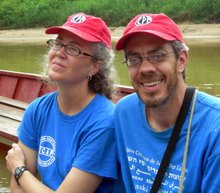Dear friends and family,
We are just finishing up a 10 day trip visiting the Peace Sanctuary Churches we got to know when we first visited Colombia with a delegation in February 2006. The pastors of all 3 churches have also been guests in our home in Minneapolis so it's been a real blessing to get to connect again. Who could have guessed all the turns our life would take since that trip just 16 months ago.
We arrived in the first peace community after spending 13 hours traveling by bus from Barrancabermeja. Our hosts wanted us to visit one of their new development projects. We went by bicycle taxi to a small farm on the edge of town where several families are collectively raising chickens. We sat talking with a small group under a thatched roof porch as we waited for our lunch to finishing cooking over a small fire.
The talk made the usual twists and turns from weather and farming to politics, and specifically, US foreign policy in Colombia. Just two days earlier in the US House of Representatives, the foreign aid appropriations subcommittee had proposed a new approach to Bush's Plan Colombia by requesting a decrease in military aid to Colombia and an increase in development spending. The increased development aid will help the victims of the conflict, strengthen the judicial system, invest in rural development, and help farmers turn away from growing coca, the raw material for cocaine. We were surprised to discover that these small farmers in rural Colombia had already heard this news about a possible change in funding and they were feeling very encouraged.
This was the first of many similar conversations as we continued our trip. And, each time, the Colombians already knew of the proposed changes to Plan Colombia. Just maybe, we told each other, the advocacy we have been doing together is working.
These peace churches know the realities of the armed conflict in Colombia. One congregation was started by hundreds of families who were forced to flee their farms after the violence towards them became too great. Each church has members who have been disappeared or killed. The pastors themselves have been threatened. Just last year one of our hosts received a series of phone calls from an armed group demanding money and threatening him and his young family. His church responded with a round-the-clock vigil at his house until the threats subsided. In the midst of these realities these churches have resolutely proclaimed themselves peace sanctuaries and rejected any use of violence to end the conflict. Instead they have promoted economic development for their communities, alternatives to military service, and negotiated solutions in an effort to end the conflict.
After we said good-bye to one of our hosts we drove out of their town of 12,000 people in a taxi. Five army tanks and 15 soldiers lined the road. How, we wondered, will these tanks bring peace to this small farming community?
These conversations are a stark reminder of the direct impact that decisions made in Washington, DC are having on the people of Colombia, and the ongoing need to bring their stories back to the United States.
We are buoyed by the news from Washington that Plan Colombia may be facing significant changes. Still, there is much more work to do. A Free Trade Agreement with Colombia is still up for debate and all of our Colombian associates suggest that while this agreement will benefit the large landowners and big business of the US and Colombia, it will further worsen the economic crisis facing the majority of poor Colombians. This economic crisis fuels the conflict as young men join the illegal armed groups for lack of other economic opportunities, and farmers grow coca because the prices they receive for other crops won't support their families. Also, while positive changes to Plan Colombia have been proposed in the House, there is still a lot of work to do before the proposal becomes law. The full House is expected to vote on the foreign aid bill some time next week, so your calls to congress are needed. Visit http://www.lawg.org/countries/colombia/alert_06-07-07.htm for more information on how to call your congressperson and what to say.
Within our team in Barrancabermeja we still have much to learn and, we hope, more to contribute. For this, and so many reasons, we have decided to return to Colombia for another 6 months after spending the summer in Minneapolis. The most difficult part of this decision will be living far from friends and family for 6 more months, but it's the very support and encouragement we have received from so many of you that make it possible to return to Colombia.
We hope to see many of you this summer in Minneapolis. We also hope to arrange some presentations so please let us know if you have a group that is interested. After July 11 we can be reached at Michele's parents at 651-633-4451. The month of August we expect to be back at our house with our former phone number, 612-822-6653.
Finally, we have a house to rent! If you know anyone who needs a short-term (probably September through March), furnished rental in Minneapolis, please pass on our email addresses to them.
In Peace,
Michele and Nils
Saturday, June 16, 2007
Subscribe to:
Post Comments (Atom)

No comments:
Post a Comment